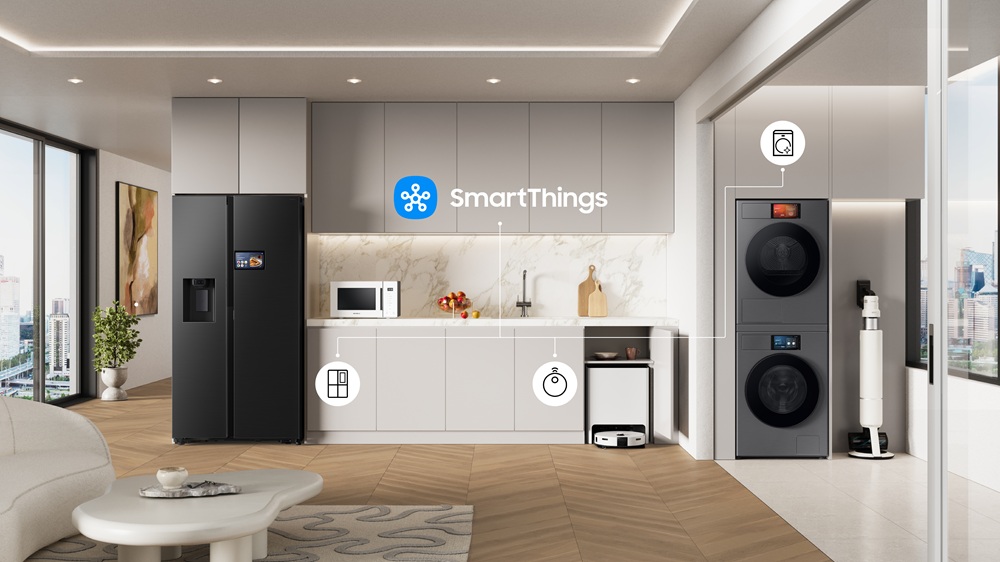Now available in 122 countries and 17 languages, HRM delivers faster, more seamless customer support across borders

Samsung Electronics is expanding its Home Appliance Remote Management (HRM) service globally, enhancing the remote diagnostic and troubleshooting experience for smart appliances users around the world. The service is now active across 122 countries with support for 17 languages, enabling seamless support for a wide global customer base.
HRM is a service that connects SmartThings-connected appliances to Samsung’s service network, maintaining a continuous record of device conditions and enabling real-time monitoring through the service center.1 With customer consent, advisors at service centers can remotely access diagnostics data – including refrigerators’ inner temperature levels, dryers’ moisture levels or air conditioner cooling performance – and provide solutions or guidance to solve issues.2
HRM has been used in remote customer support since 2020 in Korea, and was piloted across 10 countries in 2024. This year, the service has officially rolled out globally across 122 countries, supporting refrigerators and washing machines. To facilitate successful global rollout, Samsung has expanded HRM’s multilingual support from English and Korean to 17 languages in total – including Spanish, Portuguese, German, French, Russian and Czech.3
“Samsung’s HRM service exemplifies our commitment to proactive, smart customer care,” said Miyoung Yoo, EVP and Head of Global Customer Satisfaction Team, Digital Appliance (DA) Business at Samsung Electronics. “Thanks to the combination of seamless connectivity and real-time insights, this service helps to reduce complexity for our customers, ultimately enhancing their overall satisfaction.”
Enhancing Service for Screen Appliances
In line with the expansion of screen-equipped appliances like Bespoke refrigerators and washing machines, Samsung has also introduced a screen-sharing feature to enhance diagnostic capabilities. For various screens of 7”, 9” and Family Hubs, its users can share their device screens in real time with service center advisors, allowing diagnosis of display-related issues, app malfunctions or multimedia playback problems. First introduced in 2021 with Family Hub refrigerators, screen sharing expanded to refrigerators with the 9” screen in July 2025, with support for washing machines with the 7” screen to follow in September.4
Immediate Solutions and Reduced Service Visits through Remote Assistance
Samsung’s HRM service improves the efficiency of customer care by enabling real-time remote solutions for simple product issues that previously required in-home technician visits. For instance, for a customer that reported that the washing machine’s buttons were not responding, the advisor was able to diagnose through the HRM system that the Child Lock setting was active. With simple guidance on how to disable the setting, the problem was solved instantly without a technician’s visit. In another case where a customer reported condensation on the refrigerator door, with user consent, the advisor was able to remotely turn on the internal heater, which effectively eliminated the moisture.
In cases when an on-site visit is ultimately necessary, HRM improves the experience by allowing technicians to review detailed diagnostic data in advance. They are able to arrive at the site prepared with the correct parts and tools, reducing repeat visits and significantly shortening repair time. This makes HRM especially effective in large countries and hard-to-reach regions where traditional technician visits may face delays.
In regions such as the United States and India, HRM is also used proactively to address potential device malfunctions before they escalate.5 In the U.S., SmartThings-connected devices are actively monitored for a range of potential risks. When a risk is detected, users are promptly informed through SmartThings push alarms, enabling them to take timely action. Similarly, in India, the service center actively monitors SmartThings-connected appliances, identifying potential risks and reaching out to customers to discuss the issue. When required, a service engineer is dispatched to conduct thorough inspections or perform part replacements, ensuring timely and effective resolution for any concerns and preventing major issues from arising.
Growing Adoption and User Satisfaction
The utilization of the HRM system is steadily increasing, with a notable rise in usage rates attributed to enhanced language support across the regions being served. In July 2025, the number of incoming service calls globally that utilized HRM doubled compared to January of the same year. In France, the usage rate of HRM for applicable devices increased more than 30% points this year following the introduction of French language support.6 This contrasts with the previous year when the system was in its pilot phase with English, highlighting the importance of language accessibility on system adoption.
User satisfaction is also improving. In India, where the HRM usage rate for service calls is higher than other regions, the customer satisfaction score for remote service calls improved by more than 10% points in the second quarter of 2025 compared to the previous year. Key areas of improvement included the resolution of issues and the professionalism demonstrated during calls, contributing to the overall enhancement in customer experience.
With the continued expansion of customer support solutions like HRM, Samsung is realizing more convenient and efficient ways to care for home appliances – reducing downtime, enhancing the user experience and setting new standards for global service. As HRM reaches more countries, languages and product categories, Samsung remains committed to delivering smarter, more connected care for the homes of the future.
1 HRM is supported on SmartThings-enabled models released after 2019. Must download the SmartThings app available on Android and iOS devices. A Wi-Fi connection and a Samsung account are required.
2 In Korea, HRM supports refrigerators, washing machines, dryers, air conditioners, qookers, vacuum cleaners and dishwashers. In other markets, HRM supports refrigerators and washing machines.
3 Supported languages include Korean, English, French, Italian, Spanish, Portuguese, German, Vietnamese, Hebrew, Turkish, Chinese, Polish, Arabic, Indonesian, Thai, Russian and Czech.
4 Available in countries selling each product.
5 HRM does not monitor personal information, only information regarding device operation status and history. Proactive HRM applies only to certain device problems, not all cases.
6 Usage rate calculated for HRM applicable devices in France, which are SmartThings-connected refrigerators and washing machines.
Source: Samsung Newsroom, Link

Comments